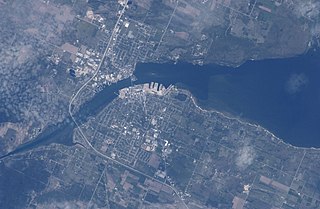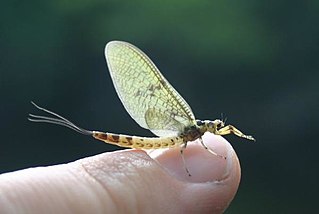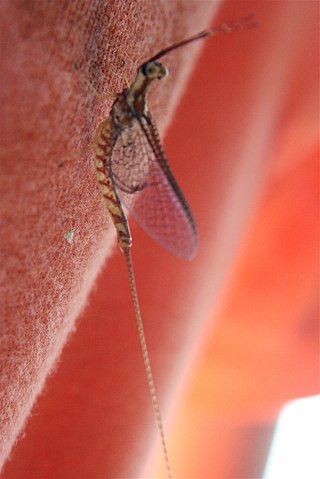
Mayflies are aquatic insects belonging to the order Ephemeroptera. This order is part of an ancient group of insects termed the Palaeoptera, which also contains dragonflies and damselflies. Over 3,000 species of mayfly are known worldwide, grouped into over 400 genera in 42 families.

Sturgeon Bay is an arm of Green Bay extending southeastward approximately 10 miles into the Door Peninsula at the city of Sturgeon Bay, located approximately halfway up the Door Peninsula. The bay is connected to Lake Michigan by the Sturgeon Bay Ship Canal. The Potawatomi name for Sturgeon Bay is "Na-ma-we-qui-tong".

Ephemeridae is a family of mayflies with about 150 described species found throughout the world except Australia and Oceania.

Stenacron is a genus of mayfly in the family Heptageniidae, with a distribution across eastern North America.
Limnoforming is the process of manipulating the physical or chemical properties of a body of water by introducing organisms which facilitate higher level biological activity, thus impacting the overall ecology of a given body of water, and eventually adjacent ecosystems.

Hexagenia is a genus of mayfly in the family Ephemeridae, the common burrower mayflies.

Hexagenia limbata, the giant mayfly, is a species of mayfly in the family Ephemeridae. It is native to North America where it is distributed widely near lakes and slow-moving rivers. The larvae, known as nymphs, are aquatic and burrow in mud and the adult insects have brief lives. They are often referred to as fish flies around the Great Lakes as they tend to cause the areas around water to smell like rotten fish.
Neoephemeridae is a family of large squaregill mayflies in the order Ephemeroptera. There are at least four genera and about 17 described species in Neoephemeridae.
Caenis tardata is a species of small squaregilled mayfly in the family Caenidae. It is found in North America.

Tricorythidae is a family of mayflies in the order Ephemeroptera. There are about six genera and at least 40 described species in Tricorythidae.
Acerpenna macdunnoughi is a species of small minnow mayfly in the family Baetidae. It is found in North America.
Euthyplociidae is a family of mayflies in the order Ephemeroptera. There are about 7 genera and more than 20 described species in Euthyplociidae.
Ephemera blanda is a species of common burrower mayfly in the family Ephemeridae. It is found in southeastern Canada and the southeastern United States.
Most likely, Ephemera compar is an extinct species of burrowing mayfly in the family Ephemeridae. It was found in North America. Ephemera compar is known from a single specimen, collected from the "foothills of Colorado" in 1873, but despite intensive surveys of the Colorado mayflies reported in 1984, it has not been rediscovered.

Ephemera simulans is a species of mayfly. It is commonly found throughout the United States. The species is used for fly fishing.

Leptophlebia cupida, known generally as the early brown spinner or black quill, is a species of pronggilled mayfly in the family Leptophlebiidae. It is found in North America.
Leptophlebia intermedia is a species of pronggilled mayfly in the family Leptophlebiidae. It is found in North America.
Leptophlebia johnsoni, or Johnson's pronggill mayfly, is a species of pronggilled mayfly in the family Leptophlebiidae. It is found in North America.
Leptophlebia pacifica is a species of pronggilled mayfly in the family Leptophlebiidae. It is found in North America.
Hexagenia orlando is a species of common burrower mayfly in the family Ephemeridae. It is found in North America.








